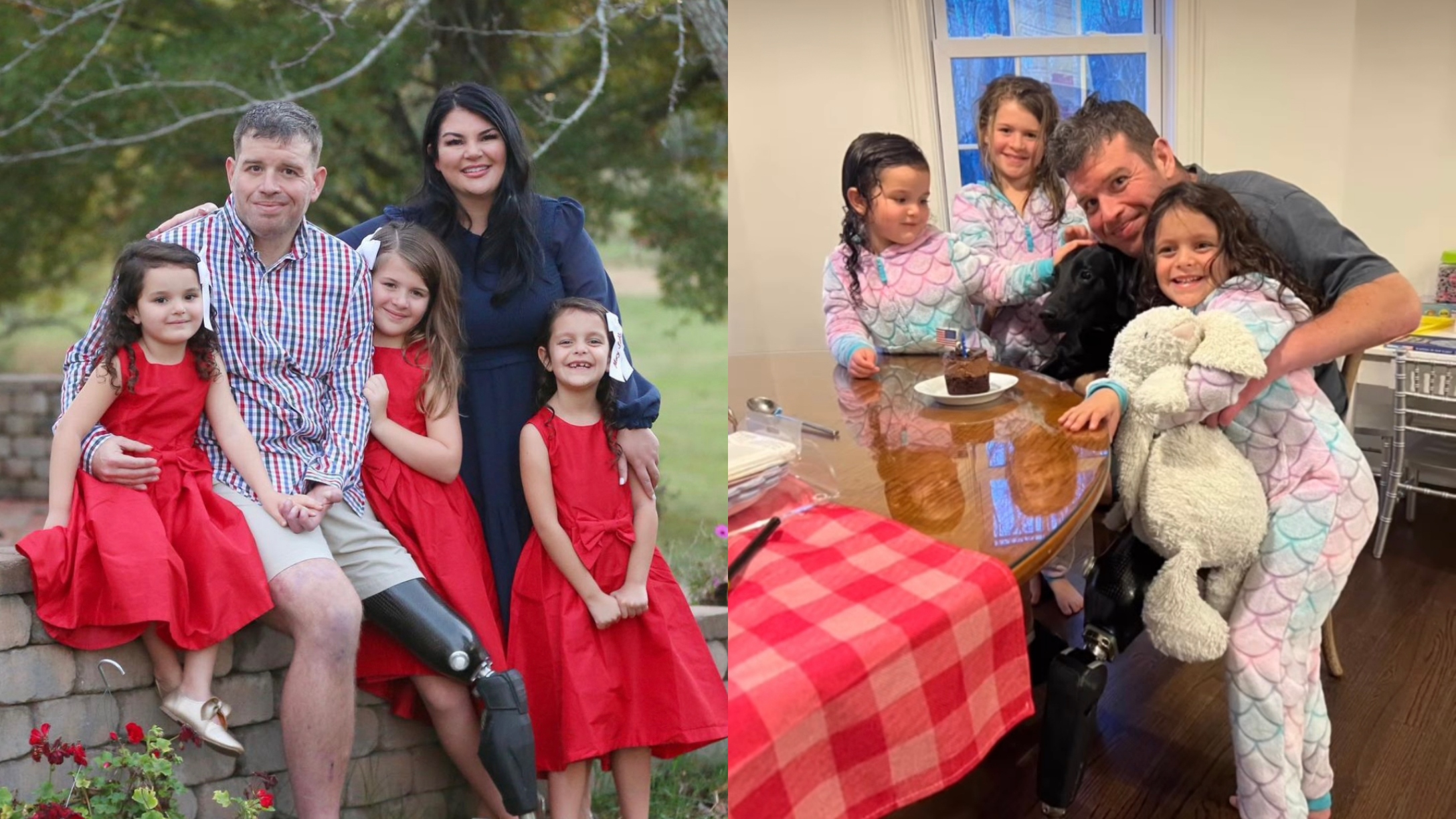
When our military heroes head to the battlefield, they risk their lives to protect the freedom of others. Many make the ultimate sacrifice, losing their lives for their country. Others are catastrophically injured and must live their lives in pain. Their loved ones also experience pain, but for some, through that pain, they find strength.
Sarah Verardo and her husband, Sgt. Michael Verardo, live daily with their three daughters and the after-effects of catastrophic injuries to Michael's body and brain. According to Today, Michael was serving in the Army's 82nd Airborne Division in Afghanistan's Arghandab River Valley in 2010 when he lost his leg in a landmine accident and experienced a traumatic brain injury. That day changed the trajectory of their family, but they never lost hope.
More From CafeMom: Combating the Disconnect: What It's Like to Have a Spouse in the Military
The Verardos do not have a typical home life.
Sarah Verardo explained in an Instagram post that her middle daughter, Mary Scott, asked her mom when she and her dad would be going out on a "date" together. The question took Verardo aback, and though she is used to fielding tough subjects with her kids, this one stung a bit.
"I told her that because he goes to bed so early and the other challenges he faces, it didn’t seem likely," she explained.
“I’m sad for you. I want you to go on a date,” her daughter replied.
Verardo told Mary Scott she shouldn't feel sad because she has memories of lots of past dates with her husband, which is all that matters.
"I don't have memories of him mama," the little girl said.
"Knife to heart," Verardo wrote in her post.
Sometimes, there isn't a bright side to their situation.
Verardo explained in her post that although she likes to be bright, life isn't always that way and that she wanted to validate her daughter's feelings.
"I stay in the light because the sadness of what could have been is too much for me to comprehend. But instead of dressing it up or playing it down, I validated her feelings. It IS sad. It IS hard. It DOES look different than we'd all hoped," she wrote in her post. "But our God is a restorer and a redeemer (thank you @elizabethpoplin) and that means that we don't have to carry it alone. We have a story — Michael, our daughters, and I — which involves unwavering commitment, endless grace, and boundless love. That IS the bright side."
Verardo is candid with her daughters about their dad.
Verardo told Today that she doesn't hide their dad's injuries from their daughters, and she wants them to understand that sometimes their dad is different.
"One day Michael is present — he knows our girls, he is alert and can hold a short conversation," she said. "Other days, we're not so lucky. My girls are aware of so much and yet understand so little."
She actually wrote a children's book, Hero at Home, to explain war injuries to children. She tries to keep the conversations at her home positive, but she is also direct about the extent of their dad's injuries.
"I often tell the girls, 'Dad has a sleepy brain — it seems like his brain and body keep changing but he still has the same heart,'" she explained.
More From CafeMom: NEWS
Army Kids Find Genius Way To Tell Their Dad They Love Him Every Day While He's Deployed
Verardo works tirelessly for veterans.
According to her website, Verardo is a national advocate for wounded veterans and their caregivers. She is a wife, mother, caregiver, advocate, and author. She uses social media platforms to raise awareness about war injuries, particularly a traumatic brain injury, also known as TBI.
"Her groundbreaking leadership within two separate organizations has granted her a unique and powerful look at the needs of Veteran and Ally networks and given her the opportunity to steward resources and support where and when they are most crucially needed," her website reads.
March is TBI Awareness Month.
Many spread the word about TBI in March, but it is a year-long cause for the Verardo family. She explained to Today that she wants people to be educated about TBI, including children, who often don't understand.
A recent encounter with two boys from school was tough for one of the Verardo girls. Their father went with a caretaker to the bus stop to get his daughters, and although the kids could see and understand his leg injury, the brain injury was harder to grasp.
'"It wasn't his leg, Mama. They asked what was wrong with him. Like maybe it was about how he was walking or staring or not talking,'" Verardo quoted her daughter to Today.
This was a teaching moment for the children and herself, Verardo explained. She spoke to the boys' moms and realized that it wasn't about making fun. Instead, it was about being confused.
According to the Centers for Disease Control and Prevention, TBI is a significant cause of illness and death in the United States. In 2020, more than 64,000 TBI deaths occurred, approximately 176 per day. TBIs are most commonly related to a fall, firearm-related injury, motor vehicle injury, and assault.
"Depending on the severity of the injury, those who get a TBI may face health problems that last a few days or the rest of their lives," the agency notes on its website. "For example, a person with a mild TBI or concussion may experience short-term symptoms and feel better within a couple of weeks or months. And a person with a moderate or severe TBI may have long-term or life-long effects from the injury."




